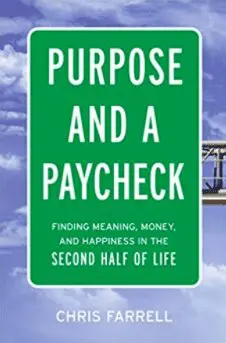by Chris Farrell (2019 – HarperCollins Leadership)
Subtitle: Finding Meaning, Money, and Happiness in the Second Half of Life
Book Review by Joe Casey
Books on retirement tend to focus primarily on financial planning. Economist and journalist Chris Farrell covers the financial side of the road, but he also goes beyond that in this inspiring book. He tells the captivating story of how baby boomers are re-inventing themselves – and retirement – through self-employment and entrepreneurship.
The idea of working in retirement seems like an oxymoron to some. But Farrell provides an accessible tour through the research on the benefits of working longer. The rewards include but transcend the financial side. Farrell points out that while generating income longer is helpful, many baby boomers are seeking “a calling not a job” in a second career. Continuing to work, in some fashion, can provide a renewed sense of purpose and meaning. These benefits, in turn, have been associated with wellness and longevity. But Farrell stresses that work in retirement is a choice. It’s not for everyone. But this book may lead you to give serious consideration to how some work, especially purpose-driven work, can play a part in your retirement life.
A New Life Course is Emerging
In earlier generations, life generally followed a path defined by institutions and clear transitions. You completed your education, then you began a career, and after decades of work often with a single employer, you headed off into retirement. Simple. And retirement was often a much shorter phase of life. Much of that is dramatically changing.
” The school-work-retirement-silos are coming down, thanks to the powerful combination of an aging population, globalization and technological innovation. The rewrite of the new life course is still being drafted, but a more complex narrative is being scripted. The baby boomer generation is the lead writer, but other generations will weigh in, too.”
People of all generations are following a greater diversity of pathways today. Those paths generate new opportunities and possibilities but challenges too. In this new life course, education does not conclude in your twenties. Learning is a lifelong endeavor. And today, there’s a greater need to make a mid-life career change more often than previous generations.
But institutions are not as nimble as individuals. While change is underway, progress is slow and institutional obstacles need to be skillfully navigated. For example, Farrell notes that corporate benefits plans (and legislation around retirement benefits) are rooted in the old model. That leads to restricting options like phased retirement in the vast majority of companies.
Flexibility Generates New Ways of Working in Retirement
The trio of powerful demographic, globalization, and technological changes in recent decades have opened up broader possibilities. Because of these changes, people today want greater flexibility in how we live, work, and retire. Many are experimenting with creative ideas for second careers. For experienced workers, an array of options have evolved that can be negotiated with many employers, such as semi-retirement, gradual retirement, part-time schedules, and alternative work arrangements. Farrell shares his insights on why self-employment and entrepreneurial pursuits are attractive options for many baby boomers. First, they provide far greater flexibility. Second, they offer ways to creatively use valuable skills and experience in new ways. Third, they represent a way to “end run” the unfortunate realities of age discrimination.
What Employers Don’t Get About Experienced Workers
Farrell takes on a few myths about “workers of a certain age” head-on. (He endorses using the phrase “experienced workers” in lieu of older workers, for which I am grateful…). In his view, many employers cling to outdated (or flatly wrong) assumptions. He specifically cites incorrect perceptions and beliefs that many employers have on the productivity and creativity that experienced workers bring to the table. He also calls for increased awareness of language used to describe older adults. He advocates the elimination of a number of popular words and phrases (like ‘senior moment’) that are inaccurate and insensitive.
Retirement is Intergenerational
One of the most interesting parts of this book on retirement and later life is the chapter on Gains from a Multigenerational Society. Farrell highlights the various ways in which multiple generations are embracing living, working and volunteering together. He shares stories and examples that illuminate how – and why – the evolving relationships between generations today offers hope for the future.
The first book I ever read on retirement was Unretirement by Chris Farrell. It is an excellent read. His latest work Purpose and a Paycheck is far and away one of the very best books on retirement life that I’ve read. It has a strong empirical base, which is critical – but it also has a heart and soul to it. The research cited makes the case and the personal stories bring it to life. The author paints a realistically optimistic picture of opportunities in the second half of life for people to work more flexibly and apply their skills for income, wellness, and social good.
Many books on adjusting to retirement are helpful. This book takes it further and can inspire an entirely new vision for your life in retirement. If you’re considering self-employment and you’re intrigued by the possibilities of a second career with purpose and meaning, this is highly recommended.
Purpose and a Paycheck is available on Amazon
The Retirement Wisdom Podcast
Listen to our conversation with the author on our retirement podcast here

